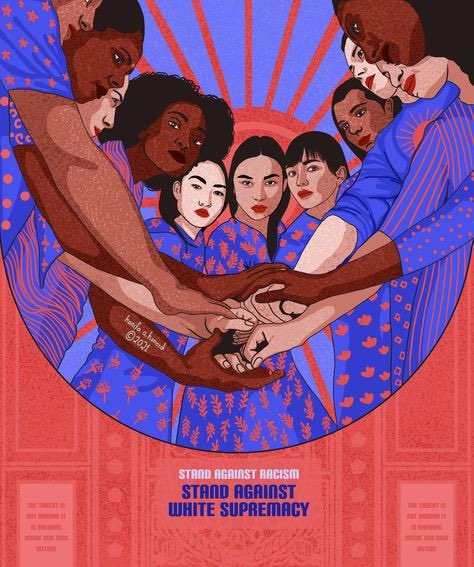Before you read,
If you are Asian or have grown up around older Asians, you have probably heard your parents or someone older say something blatantly xenophobic against other Asian countries or POC, and this has probably occurred more than once. It can be incredibly frustrating to hear your own family members, especially your parents, say things that you not only disagree with but that also feed into prejudices and hatred. Growing up, I used to hear all sorts of things from my older family members, and it was incredibly difficult to begin to separate what statements were valid and what statements were simply xenophobic, racist, or perpetuated harmful stereotypes. This dilemma is something that is not unique to any one ethnic or racial group, but it is something that we can all learn to address within our own communities. It is important to discuss and examine these issues, whether that be in our own families, ethnic communities, or the Asian community as a whole.
Many people tend to believe in a common sentiment that older generations tend to be more prejudiced than younger ones, and that with time, the world has seen much progress. In many ways, this statement is true. In the past, stretching no more than 60 years, racism in the US was not only blatantly institutional, but it was encouraged by the common people. Segregation was obvious and was just seen as the way things worked. Now, from the lens of believing that the world has truly become less prejudiced, it does seem that younger people would be less prejudiced than older generations. However, it is hard to ignore the fact that institutional racism is just as alive in the US as it was in the 60s, but now it is less obvious and hidden, and the same thing applies to the bigoted thoughts of common people – people have not really become less racist after all. For the Asian community, the conclusion that not much has changed in terms of prejudice in the form of xenophobia rings very true. While the argument can be made that negative feelings towards specific countries or ethnic groups in Asia does seem to be something more prevalent in older generations as opposed to younger ones (although obviously it still exists), this defense does not really matter as long as there is an environment where intolerance is allowed to grow. Often people in Asian countries have very bigoted views of other Asian countries, ethnic groups, people of color, or immigrants. This is not unique to the actual people living in these Asian countries – many Asian immigrants or Asian Americans hold highly prejudiced views.
Evidence and possible reasons behind xenophobia in Asian communities
Xenophobia in Asian communities (including in Asian countries themselves and in other Asian communities outside of Asia) can be both against Asians or other ethnic groups, countries, and races. Two common examples are listed below:
Sinophobia

Sinophobia, or the hatred/fear of China/Chinese people/Chinese culture, is sadly a part of many Asian communities. There are valid criticisms to be made of the country, but many Asians, especially older Asians, tend to be very sinophobic towards Chinese people, which is completely unacceptable. According to Pew research, countries like the Philippines, South Korea, India, and Japan have an unfavorable view of China. This is China as a whole of course, but the very unfavorable view of China in some countries often translates over to hatred for Chinese people and people of Chinese origin, even if implicitly.
Anti-Blackness
The source of xenophobia against other ethnic groups/countries of origin are largely based in geopolitics and long histories of conflict. These wounds cannot be healed in a short amount of time of course, but realizing or helping your family members realize that simply being xenophobic or spreading stereotypes is not the way to go about addressing some of the wrongdoings they have faced. However, a lot of Asian communities also hold prejudiced beliefs against other people of color, particularly Black people. Anti-Blackness is rampant and is perpetuated by the model minority myth and colorism. We are taught by the media, whether it is western or Asian, that we are the ‘successful’ minority, or that other minorities ‘ought to be like us’, completely ignoring the systemic barriers that Asians, particularly East Asians, have not had to face to the same degree that other Asians and people of color have had to face. It also erases the differences in opportunity that Asian subgroups have had in America and in other places. In addition to this, the belief that lighter is better can also perpetuate anti-Blackness, as some Asians who hold this belief are lighter and use Blackness as a way to justify already set prejudices or biases.
Approaching prejudice in our own communities
It can be quite difficult to fully address the hatred or stereotypes that our family members and parents can hold, but it is important that we address these issues in our own homes if we are to ever make any progress. First, we should try to confront the reasons why we have come to the conclusions we have come to and how we may have progressed from beliefs we used to have. As the author of So You Want to Talk About Race, Ijeoma Oluo, says “Talk to the people that you care about who aren’t understanding this and say, ‘You know, I used to think the same way you did. But I know, like me, you care about people. And I want you to hear why I believe differently.’ And kind of share your journey”. Many younger Asians have progressed past the more xenophobic views of their upbringing, and those who have all have a story about how that happened. If we can confront our own past prejudices, there is a chance that a conversation about how this happened will perhaps change the minds of those close to us. Even if this does not work, you will have still gained a meaningful understanding of how your beliefs progressed, and this may be able to help someone other than your family members.
Another important thing you should acknowledge before you talk to your family members is why they hold the beliefs that they do. What led them to think the way they do? Was it a specific event or experience? Or was it their general upbringing? It is important that we try to identify why our family members hold their beliefs so that we can come up with a way to approach them and reason with them.
When you do talk to your family members about their biases and prejudices, try to understand what you are trying to get out of the conversation, and in doing this, try not to be confrontational. If you make the mistake of not identifying exactly what you are trying to accomplish, you will have wasted your time and patience. Are you trying to change their minds? Do you want your parents to hear you out? Do you want your parents to stop saying certain things?
Final word
Conversations about racial and ethnic issues can be deeply uncomfortable. Nobody wants to have these conversations, but it is so important that you at least try to approach your family members, especially parents, about the issues that you feel need to be addressed. In many Asian cultures and cultures of other people of color, any disagreement or suggestion for change coming from a younger person to an elder may be seen as a sign of disrespect, which makes it especially difficult and sometimes even impossible to reach out to our family members sometimes. But if we never even try to discuss the prejudices and biases we see in our own family, how will we ever make any change outside of our homes? How can we expect others to do the same? If we cannot even confront the racism and xenophobia that grows in our own homes, how can there ever be change in our schools, cities, and larger communities?
Sources
www.pewresearch.org/global/2019/12/05/attitudes-toward-china-2019/
www.pewresearch.org/fact-tank/2017/10/16/how-people-in-asia-pacific-view-china/
Edited by Michelle Nishidera


